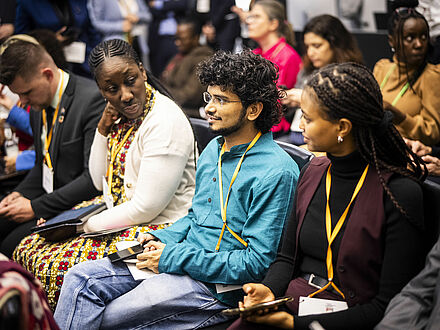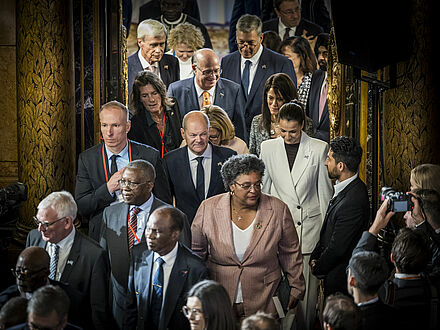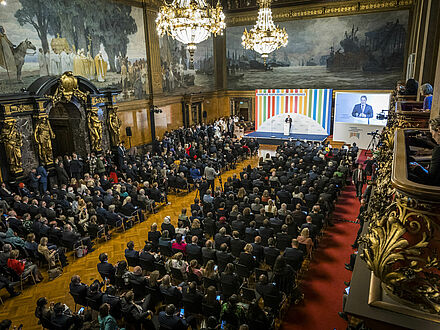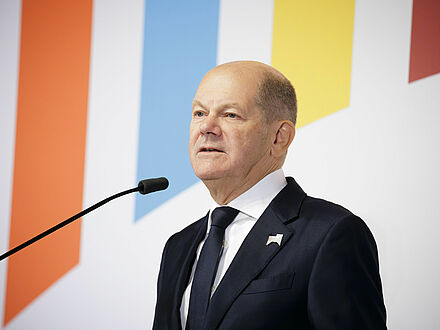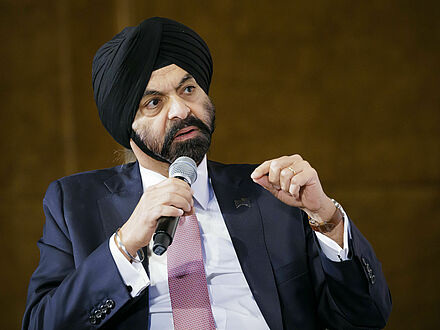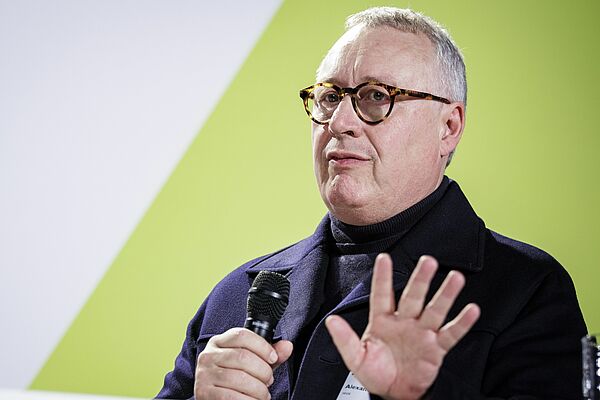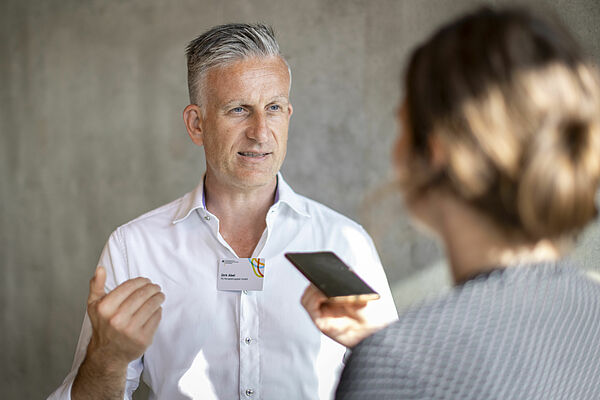New sustainability conference. Hamburg welcomes the world
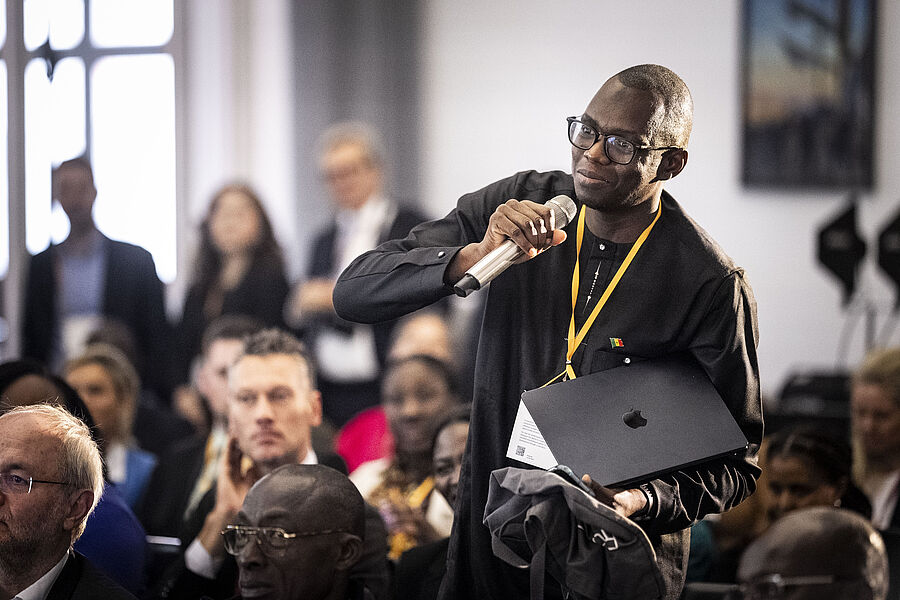
Looking back at HSC 2024
EUR 30 million for more green energy: the German Federal Ministry for Economic Cooperation and Development (BMZ) is supporting production facilities for green hydrogen and its derivatives in Egypt. This was agreed by Development Minister Svenja Schulze and Egyptian Government representatives during the Hamburg Sustainability Conference (HSC) , which was held for the first time on 7–8 October 2024.
The HSC was set up by BMZ as a regular conference with a focus on boosting sustainability. For this, BMZ together with the United Nations Development Programme (UNDP), the Michael Otto Foundation and the Free and Hanseatic City of Hamburg initiated the HSC. The first HSC held on 7/8 October brought together around 1,900 participants from over 100 countries. The goal of these representatives from politics and business, the scientific and academic community and civil society was to develop new ideas to accelerate implementation of the UN Sustainable Development Goals (SDGs). In addition to Federal Chancellor Olaf Scholz and Development Minister Svenja Schulze, the HSC was attended by other leading international decision-makers. These included ten heads of state and government, 29 ministers, 12 heads of international organisations and a large number of senior representatives from the private sector and non-governmental organisations. Across more than 60 different events, policymakers, managers, scientists, academics and representatives of civil society not only discussed key global challenges, but also agreed on concrete solutions.
‘The Sustainable Development Goals cannot be achieved without expertise and investment from the private sector. That’s why we have to succeed in developing joint financing instruments so that we can combine public and private funds more easily,’ said Federal Chancellor Olaf Scholz in his opening address. He emphasised the fact that companies are crucial to implementation of the 2030 Agenda. Partnered in new alliances, companies would have the opportunity to help shape the path to a more sustainable global economy.
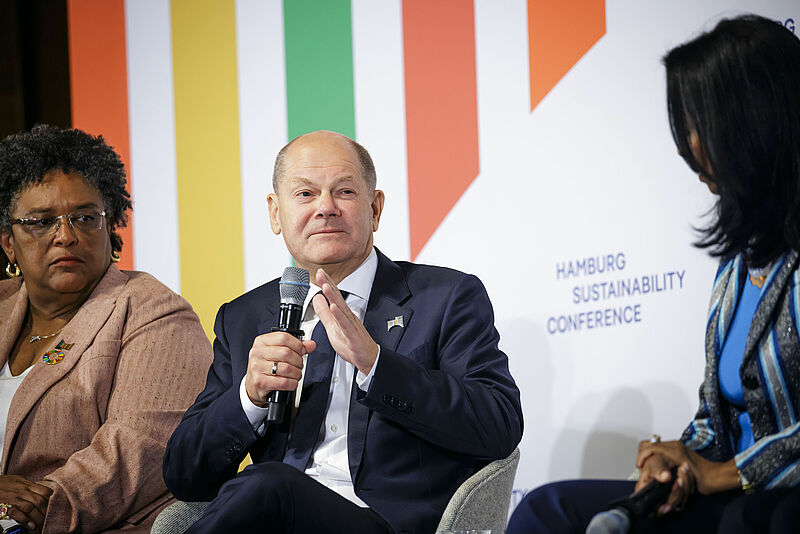
New platforms for increased sustainability
More than 15 agreements were concluded at this first HSC . The focus of all participants was on forging new alliances between stakeholders wishing to intensify their involvement to speed up implementation of the SDGs.
For example, BMZ created the new Hamburg Sustainability Platform, together with government representatives from Canada, the UK, South Africa, Denmark, France and private partners. The platform shall introduce a standardised procedure to support companies that invest in countries of the Global South. The states aim to use public money to cushion risk and incentivise investment. This all serves the goal of using limited public funds to leverage many times that amount of private investments for sustainable development purposes and to harness the enormous investment potential with countries in Africa, Asia and Latin America.
BMZ, UNDP, World Bank and other partners also dealt with the question of how artificial intelligence (AI) can be used responsibly to promote sustainability. The partners developed suitable principles on this issue and presented them at the HSC. In addition, BMZ, World Bank, the United Nations University and UNDP also launched the SDG AI Compendium. This global register provides an overview of international initiatives that use AI in development cooperation, enabling these initiatives to form more effective networks. ‘Our common goal is to ensure fair access to key digital technologies, including for the countries of the Global South. Digital technologies must be used in ways that promote the well-being of people and our planet,’ Development Minister Svenja Schulze said of the project. This work will be continued at the AI summits in 2025 and at next year's HSC.
With its more than 170 members, the Global Battery Alliance has been working on global standards for responsible battery production since 2017. The initiative has now recruited Germany and Serbia, two key players. Zambia has also announced its intention to join the alliance. Both Serbia (lithium) and Zambia (copper) have significant deposits of raw materials required in battery production. Until now, governments have not been represented in the alliance. It was made up primarily of companies from the industrial and technology sectors , such as BMW, Microsoft and SAP. After joining the HSC, governments and industry can now work together on sustainable battery supply chains.
Close partnership between the World Bank and KfW
The World Bank is a central donor for projects in developing countries and emerging economies. Within the framework of the HSC, the World Bank – represented by Ajay Banga, its president – gave a commitment to redouble its efforts to accelerate implementation of the SDGs. The World Bank to invest up to EUR 70 billion over the next ten years to combat climate change, pandemics and other global challenges. Moreover, the World Bank signed a cofinancing agreement with KfW. Both institutions are keen to jointly finance development projects and thus enable more significant investment.
Greener aviation and shipping
Without aviation and shipping, there can be no global trade. In terms of sustainability, however, these two sectors still have considerable room for improvement. Within the framework of two declarations made at the HSC, key players agreed to establish a sustainable value chain for green hydrogen for use in aviation and shipping. A total of 13 companies signed the Hamburg Declaration on the Decarbonisation of Global Shipping, including the Hamburg-based logistics company Hapag-Lloyd and the port authorities of the cities of Yokohama, Barcelona, Los Angeles and Antwerp/Bruges. The common aim of these companies is to develop sustainable shipping corridors and to finance investment. Within the framework of the Hamburg Declaration on Green Aviation the businesses involved agreed to set up ‘green aviation hubs’ – central locations where companies can jointly produce and use environmentally friendly fuels. Through approaches such as these, companies are not only combating climate change, they are also pioneering the development of new markets. Participants in the cooperation include Hamburg Airport, Deutsche Post AG and the green hydrogen producer HH2E.
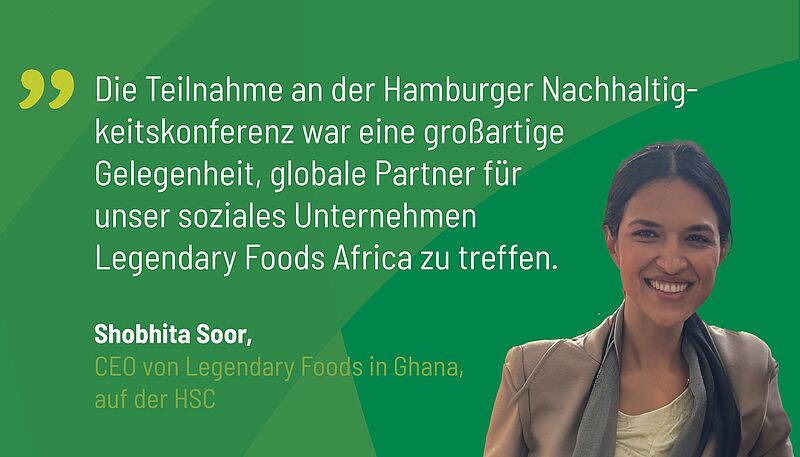
Environmentally friendly production of fertilisers
The Egyptian company Egypt Green Hydrogen (EGI) intends to invest a total of EUR 500 million in production and will receive a grant from BMZ’s PtX Development Fund. It plans to convert the hydrogen produced into green ammonia for use in the manufacture of fertilisers. From 2028, EGI aims to be producing up to 70,000 tonnes of green ammonia per year, saving more than three million tonnes of CO2 over the project’s complete life cycle. The ammonia will comply with international standards and is to be approved for the EU market too.
Putting the economy centre stage
After the HSC, what’s next? How can we ensure that all stakeholders stay on the ball and press ahead with planned projects? As soon as this conference is over, the focus will shift to the next: the second conference will take place in Hamburg in 2025.
You are very welcome to take part in the next HSC!
Please submit your event proposals by 13 December 2024 on the HSC website. You are also welcome to contact your partner organisations and companies and encourage them to submit good proposals for strong SDG results.
By the start of HSC 2025, the initiators and partners will have operationalised and further developed the agreements reached. One crucial aspect of this will be to involve as many different stakeholders as possible in its collaborative design, in particular those from the private sector and countries of the Global South. Chancellor Olaf Scholz highlighted this in his opening remarks: ‘To make sustainable progress, we need to use new formats to bring the ideas and expertise of all stakeholders to the same table.’ The HSC provides a global platform to do so, aiming to bring new partners together and create alliances in the future too.
Impressions from the Hamburg Sustainability Conference
(c) HSC
Published on
